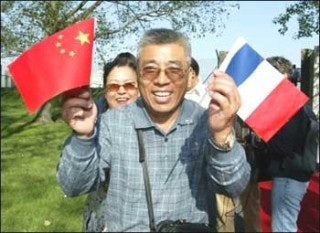Popular Films, More Accessible Travel Draw Mainland Tourists To Remote Locales Both In China And Abroad#

Last year, the blockbuster “If You Are the One” by Chinese director Feng Xiaogang included a 20 minute sequence shot at Xixi in Hangzhou, in China's coastal Zhejiang province. In the movie, the lush foliage and ambiance of the Xixi wetlands swept audiences off their feet and heightened the desire of thousands of people to sightsee in China's more remote areas. Suddenly, the once tranquil, rural village of Xixi received an influx of visitors from all over the country, along with a much needed boost for the city's tourism industry. For many in China, the runaway success of Feng's film, and the resulting tourism boom spoke to the powerful advertising effect of the movie industry. But for businesses and tour operators, the flood of domestic tourists seen headed to Xixi last year reflected the willingness of the growing numbers of Chinese who can afford to take vacations at the drop of a hat to spend more freely than ever before.
The following video clip (Chinese) offers a glimpse into Xixi's 2009 tourist boom:
The tidal wave of tourists in Xixi doesn't end there. In recent years, traveling by mainland Chinese has been more global, rather than remaining confined within the country's borders or the Asia-Pacific region. Nowadays, for those who can afford it, trips to Europe and North America have become increasingly popular, particularly with China's super-rich, who often enjoy taking their families along to expose their children to completely new environments and broaden their outlook through absorbing some aspects of Western culture. For most of these wealthy globehoppers, they have ulterior motives for bringing their children along: to lay the foundations for the international education they'll likely send these kids abroad to receive in later years.
According to the French Department of Tourism, today Asia is one of the top sources of inbound tourists, led by Japan and China. These countries, the second- and third-largest economies in the world, have obviously attracted the attention of French travel agencies, who recognize the importance of these Asian travelers due to their high spending relative to other international tourists and, in the case of China, huge population size and increasing number of outbound tourists.

To cater specifically to the growing ranks of international Chinese tourists, the French Department of Tourism has worked overtime to portray France as an arts and luxury paradise, a move that has played well among the Chinese business elite, who have become obsessed with the idea of cultivating a more "noble" (conceptualized by most to mean "European") appreciation of luxury goods, art, wine and architecture. But the draw of France, Paris in particular, isn't limited to China's tiny proportion of super-rich. It also extends to more budget travelers, or younger tourists, who see Paris as a great destination for shopping.
With the growing number of Chinese tourists, many of whom have been the beneficiaries of the country's economic boom, it's no surprise that business has also boomed for luxury hotels in major tourist destinations around the world. In the current economic climate, some five-star hotels are virtually relying on an increase in the number of mainland tourists to buoy them until tourists from traditional markets come back in full force. Whether the recent economic downturn will ultimately lead to a sustained focus on catering to Chinese tourists for years to come, or if this development proves temporary, everyone from hotel managers to tour operators and travel agents to airline execs knows that outbound Chinese tourism will continue to increase for the foreseeable future, and China is a place that companies can't afford to ignore.
The writer of this article, Yue Li is a Jing Daily correspondent based in Beijing.
All involved think next year could prove pivotal in reaching out to that wider market.
Google google google google google Google google google google google Google google google google google Google google google google google Google google google google google Google google google google google Google google google google google